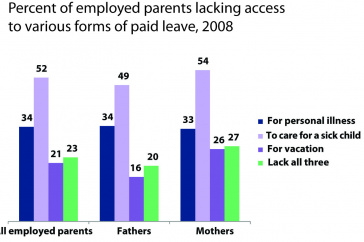Carsey Institute at UNH: Lack of Sick Leave to Care for Children Creates Tough Choices for Parents

Percent of employed parents lacking access to various forms of paid leave, 2008
DURHAM, N.H. - More than half of employed parents lack at least five days of paid sick time to care for their children, with mothers more often than not missing more work than fathers to stay home with a sick child, according to new research from the Carsey Institute at the University of New Hampshire.
The research was conducted by Kristin Smith, family demographer at the Carsey Institute and research assistant professor of sociology at UNH, and Andrew Schaefer, research assistant at the Carsey Institute. It is presented in the brief "Who Cares for the Sick Kids?
Parents' Access to Paid Time to Care for a Sick Child."
"Roughly one-half of employed parents lack access to enough paid sick days to care for a sick child. Yet, all children need parents to care for them when they are sick and to take them to doctor's appointments. Since the majority of children miss at least one day of school each year, access to these paid sick days is critiÂcal for employed parents," the researchers said.
The key research findings are as follows:
- In 2008, more than one-half — 52 percent — of employed parents lacked access to at least five paid sick days to care for a sick child; lower-earning parents had the least access.
- Although employed mothers and fathers have similar access to paid sick days to care for their sick children, mothers more often miss work to care for a sick child. Seventy-four percent of employed mothÂers report staying home from work when their child is sick, while 40 percent of employed fathers state the same.
- Employed parents with paid sick days to care for a sick child are 1.9 times more likely to be very satisfied with their job than those without this access.
- Being able to earn paid sick days to care for a sick child reduces work-family conflict for employed parents.
"All employed parents must manage work and caregiving responsibilities. Workplace policies, such as being able to earn paid sick days to care for sick children, play a large role in this balancing act, and ultimately influence the ability of parents to meet the health needs of their children and to remain and advance in their job. Children's health and public health should not suffer just because of the conditions of the job a parent holds," the researchers said.
The complete Carsey Institute report about this research is available at http://carseyinstitute.unh.edu/CarseySearch/search.php?id=197.
This analysis is based on data on paid sick days and work and family characteristics from the 2008 National Study of the Changing Workforce data collected by the Families and Work Institute.
The Carsey Institute conducts policy research on vulnerable children, youth, and families and on sustainable community development. The institute gives policy makers and practitioners the timely, independent resources they need to effect change in their communities. For more information about the Carsey Institute, go to www.carseyinstitute.unh.edu.
The University of New Hampshire, founded in 1866, is a world-class public research university with the feel of a New England liberal arts college. A land, sea, and space-grant university, UNH is the state's flagship public institution, enrolling 12,200 undergraduate and 2,300 graduate students.
GRAPHICS
Percent of employed parents lacking access to various forms of paid leave, 2008
/unhtoday/sites/default/files/newsroom/img/carsey/sickdays_fig1.jpg
Percent of employed parents lacking at least five paid sick days annually to care for a sick child by select characteristics, 2008
/unhtoday/sites/default/files/newsroom/img/carsey/sickdays_table1.jpg
-30-
Latest News
-
July 2, 2024
-
June 18, 2024
-
June 18, 2024
-
May 17, 2024
-
May 14, 2024

















































